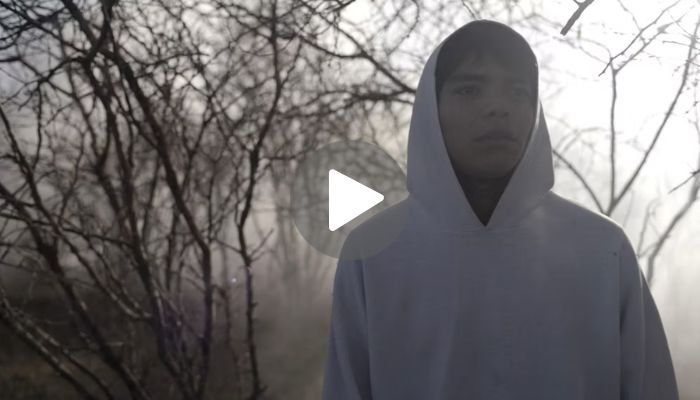
Sujo is the little film that could, and it tackles the big-deal long-running debate between free will and determinism. Free will holds that people are completely in charge of their choices; determinism says we’re shaped by forces beyond our control — all the events in our lives are fated, and therefore unavoidable.
This notion of being unable to escape one’s destiny hangs over Sujo like a cloud, much like the fog that rolls into the desert in which it’s set, but while the movie doesn’t exactly offer an answer to this conversation, its consideration of such questions makes for a powerful coming-of-age drama.
Premiering at this year’s Sundance Film Festival, Sujo was written and directed by filmmaking team Astrid Rondero and Fernanda Valadez. It tells the story of four-year-old Sujo (Kevin Aguilar), who becomes an orphan when his father Josué (Juan Jesús Varela) — a sicario for the local cartel — is killed for double-crossing the gang. Per cartel rules, male descendants of executed cartel members must also be killed (so they don’t seek revenge when they grow up).
But Sujo’s Aunt Nemesia (Yadira Pérez) begs for her nephew’s life to be spared; her wish is granted on one condition: The boy must be raised somewhere else. As a result, he spends his early years under her care — with help from her partner Rosalia (Karla Garrido) and her two sons Jeremy and Jai — in a remote house in the mountains.
Halfway through, we jump ahead to when Sujo and his cousins are now young men (Varela returns as teenage Sujo; Jairo Hernández and Alexis Varela play Jeremy and Jai respectively). All Nemesia wants is for her nephew to steer clear of his dad’s violent path, but swayed by a mixture of teenage rebellion and his cousins’ influence, Sujo ends up becoming an entry-level member of the cartel anyway. It’s not until tragedy hits close to home that he’s forced to question who he is, who he’s become, and — if it’s even possible at this point — who he wants to be.
Most films about cartels tend to focus on telling “war on drugs” stories and approach their narratives from the standpoint of crime and punishment, which often means they prioritize action and spectacle above all else. But Sujo is not your typical cartel movie. Rondero and Valadez’s film is soulful and poetic, existing on the outskirts of Sujo’s Michoacán hometown somewhere between city and country.
In Nemesia’s modest abode, one is out of the cartel’s reach. And it’s here that the film veers into magical realism territory; Sujo’s aunt acts as conduit for otherworldly energies (indeed, when Josué dies his ghost pays her a visit in a vision, which instructs her to find Sujo before the cartel does).
Ximena Amann’s cinematography shines throughout Sujo, especially when capturing Mexico’s natural landscape. Amann’s camera weaves through the trees and across rocky hilltops that — along with these bouts of magical realism — render Sujo’s childhood home almost Edenic; it recalls a culture and people that existed before they were threatened by cartels.
If anything, what this film does is place the cartel as a generational trauma, and through its young protagonist it looks for ways to end violence. That makes a Mexican cartel threat somewhat less insurmountable — or at least not so much of an uphill battle against them like Sicario would have you think.
That’s not to say Sujo takes on a naive stance or is any less gritty and violent than it needs to be. In fact, there are times when the movie feels like slow-burn suspense thriller as we watch Rondero and Valadez peel back the curtain on the cartel’s violent acts to remind us who still has power in this small town. What’s more, in a stroke of brilliance from directors, these moments happen off-screen — but because we hear them from Sujo’s perspective as a scared child, it all feels much darker and more evil.
Varela starred in Rondero and Valadez’ previous movie Identifying Features, and after watching him in Sujo it’s clear why they wanted to work with him again. There is such maturity to his sensitive yet weighty performances that defies his age; he wears Sujo’s heavy heart on his sleeve with a hint of precociousness and even rage. But it is during the last chapter of the film when Varela truly shines: Sujo escapes into the big city.
Here he navigates odd jobs just enough to get by while hanging around school — Susan’s (Sandra Lorenzano) literature class in particular — finding himself in this new world. The excitement and fear shine through his eyes as he faces unknown.
After going through hell with the cartel for couple chapters Susan’s section is somewhat relieving. Lorenzano breath freshness into every scene she is involved with; her portrayal no-nonsense dedicated teacher will inspire many people out there who had lost faith long time ago thinking nobody cares about them anymore. In fact it is those quiet conversations between them that bring hope back into light again. This young man had his childhood stolen and now he stands on the edge of starting over.
Besides Susan being from Argentina having immigrated to Mexico in order escape bloody dictatorship makes her not judge Sujo by his past. They are at once teacher/pupil, mother/son and in some sense refugee/refugee. It’s easy said than done turning your life around especially when you used be part gang but just as much determined make jump — avoiding spoilers here — something comes knocking door threatening drag him back down dark.
Sujo has already gone back and forth about whether we’re in control of our own destinies. You don’t realize you’ve been holding your breath for answer until final scene cuts black and — like Sujo — you exhale as last act plays out
Watch free movies on Fmovies







